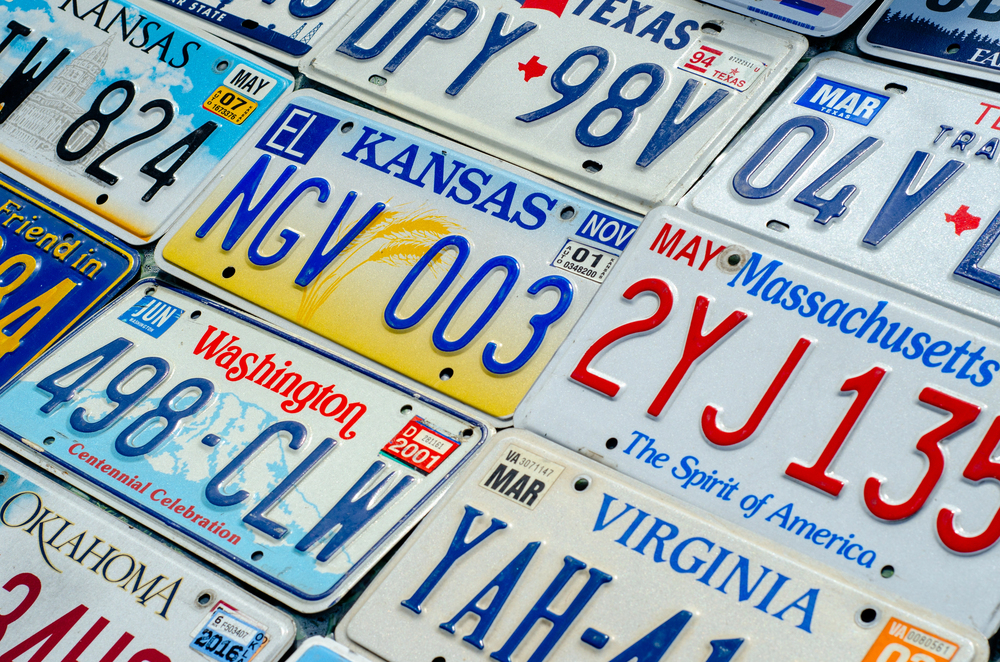How to get a custom license plate in your state
Valerie Raskovic

In every U.S. state, license plates do more than just identify vehicles; they reflect the unique local law enforcement needs and history. With some restrictions, most states will allow you to personalize license plates. Personalized license plates are often referred to as “vanity plates” and they allow vehicle owners to display numbers, words or phrases of their choosing.
New York was the first state to require license plates in 1901, though in the earliest days drivers were responsible for making their own plates—usually out of leather, wood or metal. By 1918, license plates became standardized, with all states adopting some form of government-issued plates. However, owners are still able to select specialty plates with marks and symbols promoting causes or displaying affiliations, supporting everything from military service to environmental conservation. Eventually, this expanded into allowing fully customized license plate numbers, letting drivers add a personal touch to their vehicles.
In the current day each license plate, whether standard or custom, is tied to a vehicle’s registration record, making it easy for law enforcement and parking enforcement to identify the owner’s name and personal information. Just like any other standard government issued license plate, custom plates must comply with readability standards, meaning they can’t be confusingly close to regular serial numbers used by the state.
Custom plates today typically allow motorists to choose a combination of letters, numbers and sometimes spaces within the formatting rules of the issuing state. Requests are submitted to a state’s Department of Motor Vehicles (DMV) or equivalent agency. Fees for custom plates range from $25 to over $100 annually, depending on the state and whether it’s a specialty background.
Every state enforces strict guidelines meant to prevent offensive, obscene or misleading messages. Most DMVs maintain and update a list of banned words and screen each submission for violations. Despite this, some clever or borderline messages occasionally slip through, later making headlines when they’re recalled.
While most vanity plates are ordered for the purpose of personalization, fees paid for those plates go directly to the DMV. There are some states that offer charity and cause-related plates. A part of the fee for a charity vanity plate is designated towards nonprofit organizations. For example, in Illinois, a portion of the fees paid for a breast cancer awareness plate, goes to various breast cancer research charities.
If you are dead set on getting a custom vanity plate it is important to remember that most states limit the number of characters allowed on a plate. For example:
- California allows up to 7 characters on most vehicles.
- New York permits up to 8 characters, depending on the plate design.
- Texas typically allows 6 characters for some specialty plates and up to 7 for others.
- Vermont and Maine, with smaller populations, may offer more flexibility due to fewer plate combinations being in use.
Different states have different laws pertaining to license plates, for example:
- In Florida, plates are reissued every 10 years for reflectivity and legibility regardless of whether they’re custom.
- New Hampshire has famously liberal plate policies but still reserves the right to deny plates they deem inappropriate.
- Some states may have a bit more lax policies and/or lower fees, encouraging drivers to get vanity plates. Virginia happens to be one of those states with about a 10% vanity plate program adoption rate. It has more cars with vanity plates than any other state. This means 1 out of every 10 cars registered in the state of Virginia has a personalized tag. In contrast, Texas and Alaska have the least amount of vanity plates per registered vehicle in the country.
- Recently some states have started offering digital license plates. California and Arizona are the first states offering the digital plate pilot program. The main benefit of this program is the fact that the plate’s appearance can change for security or administrative purposes; however, it is somewhat controversial and still in testing stages with no signs of mainstream adoption coming anytime soon.
Whether you're adding your nickname, a favorite phrase or just want your car to stand out, a custom license plate can be a fun and relatively inexpensive way to personalize your vehicle. However, it is vital to keep in mind that behind that playful touch is a well-regulated system based on various state laws and standards. Contact your local DMV for further information related to the laws, regulations and fees surrounding a vanity plate program in your state.
Read more articles

